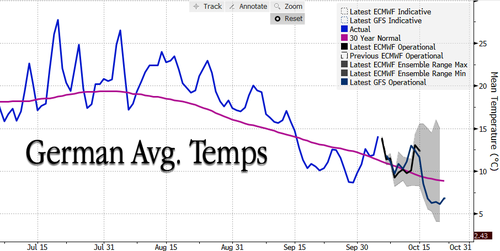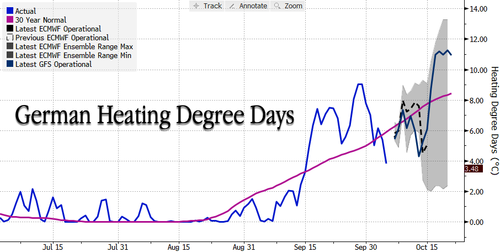
Germany is entering a dark winter with too much natural gas consumption and may be unable to avoid an energy "emergency" in the months ahead, the head of the country's network regulator warned Thursday, according to WaPo.
"Gas consumption increased by too much last week," said Klaus Mueller, head of Germany's network agency.
With the bombing of the Nord Stream pipeline system in the Baltic Sea and overall reduced NatGas flows from Russia amid the war in Ukraine, German households and businesses need to increase energy conservation more than ever as average temperatures across Europe's largest economy are set to slide to near 5 degrees celsius in the second half of the month.
Heating degree data shows the heating season has started.
The inability to reduce NatGas consumption will only increase the risk of drawing down supplies in storage quicker and could spark a continued surge in NatGas prices. NatGas consumption last week for households and small businesses was 10% higher than average consumption levels between 2018-21.
"We will hardly be able to avoid a gas emergency in winter without at least 20% savings in the private, commercial and industrial sectors.
"The situation can become very serious if we do not significantly reduce our gas consumption," Mueller said.
There's some good news. NatGas continues to be injected into storage. The total storage level in Germany is about 92.75% as of Oct. 6, well above government targets for this time of year.
And, of course, there are no overall optimistic stories here, so we'll leave you with the bad news. Florence Rabier, director-general of the European Centre for Medium-Range Weather Forecasts, told FT that forecasts for November and December in Europe would bring "colder spells and less wind and rainfall, reducing the generation of renewable power."
The Germans better fire up those coal and fossil fuel plants while increasing nuclear output to prevent widespread power blackouts during peak demand hours. As for households, the cheapest way to offset energy hyperinflation is to burn wood.
Earlier this week, UK's power regulator gave citizens a dose of reality that a "significant risk" of a NatGas shortage could materialize this winter and cause power blackouts.
Germany is entering a dark winter with too much natural gas consumption and may be unable to avoid an energy “emergency” in the months ahead, the head of the country’s network regulator warned Thursday, according to WaPo.
“Gas consumption increased by too much last week,” said Klaus Mueller, head of Germany’s network agency.
With the bombing of the Nord Stream pipeline system in the Baltic Sea and overall reduced NatGas flows from Russia amid the war in Ukraine, German households and businesses need to increase energy conservation more than ever as average temperatures across Europe’s largest economy are set to slide to near 5 degrees celsius in the second half of the month.
Heating degree data shows the heating season has started.
The inability to reduce NatGas consumption will only increase the risk of drawing down supplies in storage quicker and could spark a continued surge in NatGas prices. NatGas consumption last week for households and small businesses was 10% higher than average consumption levels between 2018-21.
“We will hardly be able to avoid a gas emergency in winter without at least 20% savings in the private, commercial and industrial sectors.
“The situation can become very serious if we do not significantly reduce our gas consumption,” Mueller said.
There’s some good news. NatGas continues to be injected into storage. The total storage level in Germany is about 92.75% as of Oct. 6, well above government targets for this time of year.
And, of course, there are no overall optimistic stories here, so we’ll leave you with the bad news. Florence Rabier, director-general of the European Centre for Medium-Range Weather Forecasts, told FT that forecasts for November and December in Europe would bring “colder spells and less wind and rainfall, reducing the generation of renewable power.”
The Germans better fire up those coal and fossil fuel plants while increasing nuclear output to prevent widespread power blackouts during peak demand hours. As for households, the cheapest way to offset energy hyperinflation is to burn wood.
Earlier this week, UK’s power regulator gave citizens a dose of reality that a “significant risk” of a NatGas shortage could materialize this winter and cause power blackouts.








